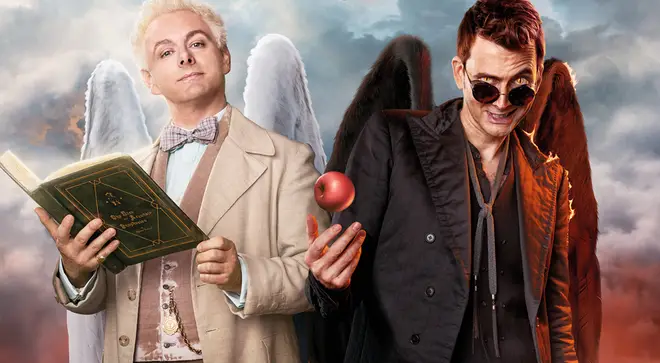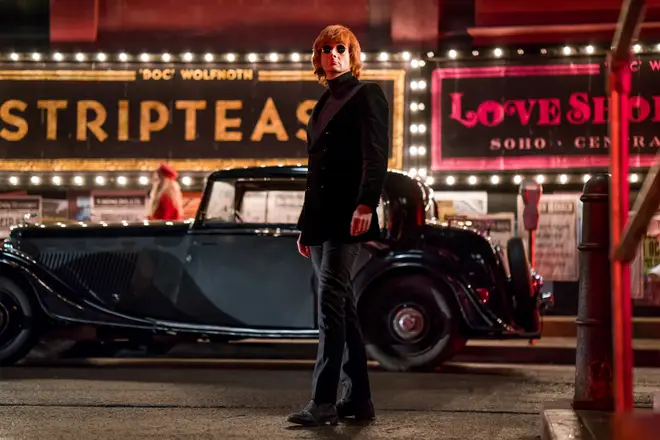On Air Now
Early Breakfast with Lucy Coward 4am - 7am
31 May 2019, 17:20 | Updated: 4 June 2019, 09:09

The war between heaven and hell has just begun on Amazon’s latest series, so we caught up with composer David Arnold to find out more about the music.
Warning: contains spoilers about Good Omens
What was your approach to writing the Good Omens score?
Good Omens is essentially about friendship and human relationships, set against the backdrop of the incoming Armageddon triggered by the delivery of the antichrist by a demon. A convent of satanic nuns have to exchange the antichrist child with a human child in order for it to grow up and use the full force of the apocalypse to bring about the end of the world… It’s a great war between heaven and hell!
I started as I so often do with the theme. It felt like a show with so many strands, so many branches of interesting characters and stories across a period of time. It literally travels from the garden of Eden through to the French revolution, the Roman Empire, World War II and London into the present day, and it all happens in heaven and in hell.
I felt all this needed to be anchored with something that tells you about the show, the story, the heart of it and what you can expect. I’m a big fan of melody and for me, a theme sequence is like a shop window – you want someone to come in. It’s basically a great window display!

So, anything that sounded good I also wanted to sound bad. Whenever there’s a celestial choir, there’s also a satanic element to it. Whenever there was a sweet violin, there would be its nasty brother lurking alongside it.
There’s a sort of devilish whirling to the music, it’s a waltz of sorts. You want it to feel almost out of control, so you’re never quite sure where it’s going to land. In episodes one and two, there are a dozen other sorts of musical approaches needed. You’ve got film noir and the crucifixion, you’re in north Africa, France, London and heaven. There are demons and churches. All these places demand an identity of their own.
Did other genres inspire you while writing the score?
There’s actually a standing joke, which is that for whatever reason everyone has got a copy of Queen’s Greatest Hits in their car – but nobody ever knows how it got there. The concept is that if you leave something in the glove compartment for too long, it’ll turn into Queen’s Greatest Hits!
At the end of every episode I re-wrote the main theme, so it’s played in a completely different style depending on what happens in the episode and there are about six versions of it. The theme is my homage to Brian May in a lot of ways. Having grown up loving Queen, rock is an easy sort of language for me to speak. While writing for Good Omens, I’d ask myself if I could create a version of the theme by Thomas Tallis that turns into ‘We Will Rock You’ – and that’s one of the slightly bizarre ideas that you have to deal with on a show like this.

Could you tell us about the music for ‘St James Park’ and ‘Lullaby’?
They all use adaptations of the main theme. The ‘St James Park’ sequence is Edwardian London, so there’s a formality to it. It’s like small orchestras, a Baroque version of [the theme], but when you’re singing a lullaby to the antichrist, my raison d'être was, ‘What if Walt Disney was possessed by Satan?’ It’s not the sort of thing you would traditionally sing to a child to make them go to sleep!
What about the choral passages in ‘Shadwell Breaks’ and ‘Requiem for a Bentley’ – could you tell us about the vocal parts that you used?
I knew I wanted to use a choir because the human voice is the most direct form of musical communication that we have. We sang before we spoke. And traditionally, when people think of angelic music they think of celestial choirs, and when they think of satanic music they think of terrifying Latin chanting sung in a threatening masculine way.
That’s the reason we used Crouch End Festival Chorus, because they can do all of those things – and smile through it too! Anything that we could do to make the music feel uncomfortable, or frightening, or excited, we could do with voices as well. And you’ve got forty performances – it’s not like using a sample, so with that comes a very different energy as you have all those people giving something of themselves. And for the orchestra we used a session group that I tend to use all the time as I know all the players. It was good fun.

What’s your earliest musical memory?
My earliest musical memory is Christmas Day morning; I was four years old and had a portable transistor radio. I woke up – as you do at that point in your life – way too early, and switched it on.
They were playing ‘The Little Drummer Boy’ and I listened to it under the blanket so thought it sounded quite creepy! They were singing the melody in quite hushed tones and because it was dark, I found it very spooky.
What inspired you to become a composer?
Watching TV and film. My mum and dad took me to the cinema quite early on and they had a lot of music around the house – and quite a large collection of musicals and films as well. I loved the way they made me feel.
When I was about six, we were in Dublin and my parents took me to see Oliver and The Jungle Book. They had such amazing visuals but also gave incredible musical experiences, and the scores were very dynamic, colourful and exciting. I wanted to be part of the noise that made me feel like that.
If you could give one piece of advice to aspiring composers, what would it be?
I think it would be the same advice that a lot of writers say to writers, which is that a writer writes always. The best thing you can do is to write music – and continually write music. Get all the obvious ideas out of the way to start discovering and uncovering the unusual ones. The underbelly of what you think and feel. Writing is a bit of a habit and it’s a good one to get into.
And if you’re trying to get into the world of TV or film, do your best to find someone who is at the same point of their career as you are. Forge a relationship with writers and directors and producers. Be a helpful part of the team – TV and film music is a team sport.
Good Omens is out now on Amazon Prime.